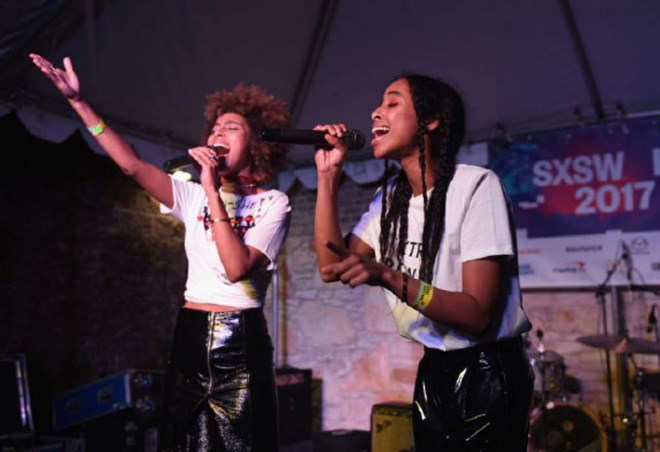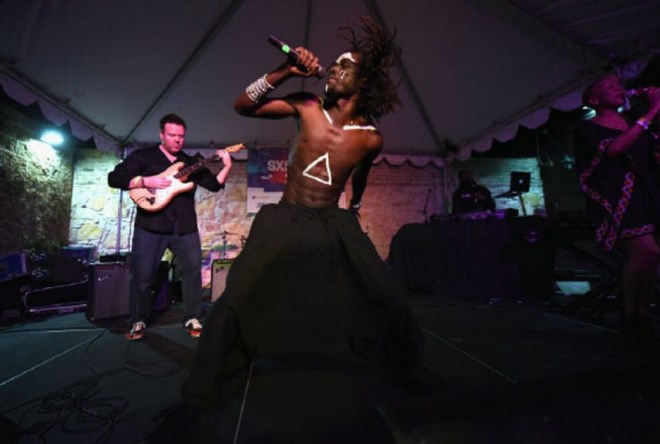
Sunday March 19, 2017
Faarrow and Emmanuel Jal, two Canadian acts with refugee roots, joined the “Contrabanned” concert in Austin on Friday, a joyful protest of Donald Trump’s travel ban.

AUSTIN, TEXAS—Music knows no borders, and all the travel bans in the world can’t do anything about it.
That was the message sent the way of the Trump administration at the South by Southwest festival on Friday evening, as artists representing the six nations targeted by a United States travel ban gathered in Austin for a defiantly joyous protest concert dubbed “ContraBanned: #MusicUnites @ SXSW.”
The musicians on hand — including Somali-Canadian sister act Faarrow and Toronto rapper Emmanuel Jal, representing South Sudan — came from worlds as varied as hip-hop, jazz, R&B and classical, but that was kind of the point. They could all easily come together onstage in the spirit of peace and unity, which a world separated by pointless political and religious borders would do well to emulate.
Further driving home ContraBanned’s point about the foolishness of Donald Trump’s attempted travel ban, the evening’s scheduled closing act, Iranian-born U.K. DJ Ash Koosha, was conspicuously absent because he was denied entry into the States to attend the festival.
Yes, these are strange, baffling times we live in. Faarrow’s Iman and Siham Hashi, for example, don’t even dare return from Los Angeles, where they’re currently living and recording their debut album, to visit their family in Toronto because they’re not sure they’ll get back into the U.S.
“We have Canadian passports but in our passports it says ‘Born in Somalia,’ ” sighed Siham on Friday afternoon. “We’re on artist visas, and we were supposed to go back to Toronto and hang out and visit our family but our parents were, like, ‘Don’t even take that chance.’ Even when we were coming back from Kenya a few years ago and there wasn’t anything about this travel ban, they put us in a little room and questioned us because our passports say ‘Somalia.’ I’m just so tired of this stigma.
“Mom and dad were just, like: ‘It’s not worth it. You guys getting stuck in Canada and not being able to come back and finish your album would be horrible.’ So we’ve kind of slowed down on traveling.”
The Hashi sisters fled Somalia for Toronto with their parents as refugees from civil war during the early 1990s and, thus, know firsthand the damage the U.S. ban on accepting refugees from countries currently facing grave humanitarian crises such as Somalia, Sudan and Yemen can do. The last drought in Somalia in 2011, they point out, killed more than 200,000 people, and there’s another one happening now.
“Most refugees are women and children but the media is all about fear-mongering and, like, ‘We’ve gotta keep everyone safe from terrorists,’” said Siham.
“So we’re excited to have this ability to represent, because when people see us we want them to know that refugees, former refugees, come in all shapes and sizes and colours and personalities. It’s not this one box of, like, a big, bad ‘other.’”
Faarrow would prefer not to let politics intrude too much on their music — which, as evidenced by last year’s Lost EP, leans toward anthemic, girl-powered pop-R&B fun of the Rihanna variety — but the tenor of the times is now compelling them to lend their voices to the causes of peace, unity and common sense in the studio as well as in interviews.
They’ve done songs about their history and the plight of their home nation, such as the famine-themed “Never Forgotten,” before, but there could be a lot more coming. The forthcoming record, to be titled Love and Light Beams, will be preoccupied, says Siham, with the struggle of “shedding all these societal pressures of being a woman, being a woman of colour, of being Somali, of begin refugees, of being Muslim — all these things that were put on us before we even knew who we are.”
“We’ve done some songs about Somalia and stuff but now we’re back in the studio and it feels almost like we have to inject a little bit more,” said Iman. “We have to. Even now, when we leave, I’m so looking forward to just getting back into the studio and just getting into ‘creative’ mode again.”
During the hours before the ContraBanned show, Faarrow also sat on a SXSW panel at the Austin Convention Centre with their fellow performers.

Toronto musician Emmanuel Jal, representing South Sudan, which he fled as a refugee, performed at the "ContraBanned" concert in Austin on Friday. (KATRINA BARBER)
All shared roughly the same sentiment that they’d prefer not to have their music overshadowed by their cultural heritage and their politics, but are being forced into that position by the xenophobic nature of the present-day White House. Someone has to speak up for all the people in the six nations covered by the Trump travel ban who can’t speak up for themselves. As Iraqi-American bandleader Dena El Saffar of the Middle Eastern folk-fusion troupe Salaam put it, “I have a microphone and they don’t.”
“I didn’t plan to be an artist, but one thing that made me become an artist was I wanted to be part of the solution,” said Jal, who lost his mother and many relatives to civil war in South Sudan before being caught up in the conflict himself as a child soldier. “If I can do this, I can represent the voices of the people not being heard. . .
“There’s a responsibility that I cannot run away from. Dead bodies talk to me, kids that died next to me. If I run away from representing their voices, I’m running away from responsibility to bring that problem to a global stage.”
Jal stressed music’s ability to unite people of all backgrounds.
“I’m here interacting with different souls here onstage and we don’t see each other’s colour,” he said. “If you want to know what the real world is, go to a studio and see different artists in one place just jamming. You will see the joy.”